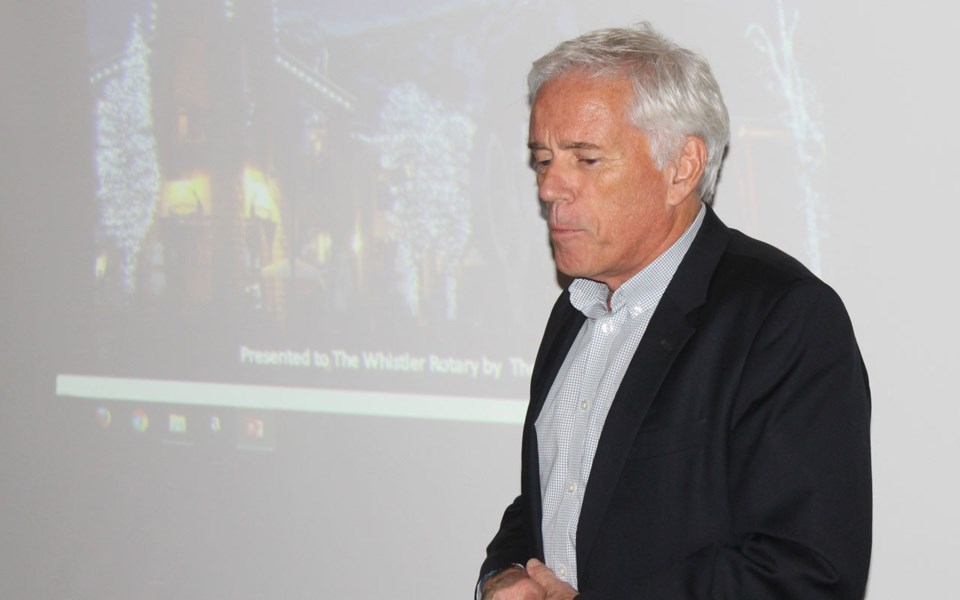Affordability is a hot topic of conversation in Whistler.
And while the conversation is often depressing, at least two leading businessmen have a few suggestions for turning things around, and for creating a new class of well-paying jobs.
"The way you do business in the mountains is different than in the city," explained Lorne Borgal, addressing a group of around 30 at a Rotary Club of Whistler event on Tuesday, Oct. 24.
Entrepreneurs need "a transition into the community," he explained.
Borgal served as Blackcomb's first CEO in the 1980s, guiding the mountain through its earliest days, before moving on to a successful business career.
He was joined by his friend and collaborator, Harry Measure, an architect who has worked with resorts around the world. Measure is based out of Whistler and helped draw up Village North.
Borgal and Measure's talk focused on "innovation centres" and "innovation corridors," communities and regions where young entrepreneurs are given the tools and mentorship they need to succeed — or at least try to.
"It's about creating businesses. And new businesses tend to be startups. And startups generally fail," noted Borgal. "This is not for the faint of heart."
But when they succeed, they create jobs and provide well-paying jobs.
During their presentation, both men held up Telluride, Colo. as an example of a town that's doing it right.
Home to the Telluride Venture Accelerator, it has a growing startup community.
"Entrepreneurship is the best tool to drive long-term social and economic change that can lead to more, high-paying jobs that are not dependent on mother nature," reads the organization's website.
By linking entrepreneurs with experienced mentors and funding sources, the accelerator offers programs aimed at fledgling entrepreneurs.
Started in 2012, its graduates have gone on to raise US$22 million. Its goal is to create five US$10-million businesses in Telluride over the next 10 years.
"(Mentors) all want to come to Telluride for an excuse to ski and mentor," said Borgal.
Innovation centres take form in different ways, with relationships with universities and government being key.
It is, however, best to avoid the trap of leaning too hard on public funds, as it can lead to more and more grant writing and not enough innovation, advised Borgal.
"We've got a situation in which the term innovation centre gets thrown around... And if you trace the money, some (of it) is lost in the boondoggle companies — it's government money, chasing government money, chasing a grant program," he said.
Recently Borgal and Measure have been working with Revelstoke, a mountain town that has been focused on getting its own innovation centre off the ground.
Sea to Sky entrepreneurs should take the long view when it comes to innovation, with Borgal suggesting a corridor that could stretch from Seattle all the way up to Pemberton.
Asked if Whistler's difficult rental market precludes the kind of risk-taking and entrepreneurship they're advocating for Borgal said: "People said the same thing in 1980 and 1985. It's always too expensive."
Times are tough and will remain tough unless better jobs are created, he explained.
Measure warned about associating innovation centres exclusively with tech, adding that they can foster all types of businesses.
"It can be health food. It can be some sort of new travel clothing, something that's innovative," he said.
Asked about the role of municipalities, Borgal said that their ability is limited.
Local government can help, particularly in the area of zoning, he said. "But they're not going to be the leader of it."
Business, said Borgal, is the place to look for funding and leadership.
Michelle Martin, of the Sea to Sky Startup Society, was on hand for the event. She sees Squamish as having the potential to become an innovation centre that could anchor an innovation corridor that includes Whistler.
"I think Squamish is the ideal place for that," she said, explaining that it is a hub for freelancers around the world.
"You can create and build a team with a wonderful set of people in a beautiful place, and be surrounded by freelancers from around the world."




